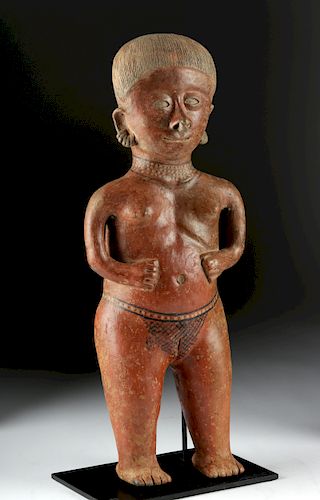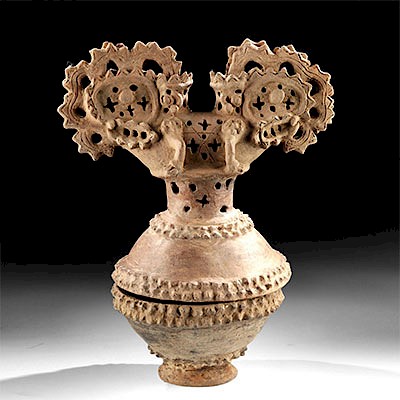Massive Nayarit Chinesco Pottery Standing Female Statue
Lot 119b
About Seller
Artemis Gallery
686 S Taylor Ave, Ste 106
Louisville, CO 80027
United States
Selling antiquities, ancient and ethnographic art online since 1993, Artemis Gallery specializes in Classical Antiquities (Egyptian, Greek, Roman, Near Eastern), Asian, Pre-Columbian, African / Tribal / Oceanographic art. Our extensive inventory includes pottery, stone, metal, wood, glass and textil...Read more
Categories
Estimate:
$13,000 - $19,500
Absentee vs Live bid
Two ways to bid:
- Leave a max absentee bid and the platform will bid on your behalf up to your maximum bid during the live auction.
- Bid live during the auction and your bids will be submitted real-time to the auctioneer.
Bid Increments
| Price | Bid Increment |
|---|---|
| $0 | $25 |
| $300 | $50 |
| $1,000 | $100 |
| $2,000 | $250 |
| $5,000 | $500 |
| $10,000 | $1,000 |
| $20,000 | $2,500 |
| $50,000 | $5,000 |
| $100,000 | $10,000 |
| $200,000 | $20,000 |
About Auction
By Artemis Gallery
Aug 22, 2019
Set Reminder
2019-08-22 10:00:00
2019-08-22 10:00:00
America/New_York
Bidsquare
Bidsquare : Fine Ancient | Asian | Ethnographic Art
https://www.bidsquare.com/auctions/artemis-gallery/fine-ancient-asian-ethnographic-art-4348
Featuring classical antiquities, ancient and ethnographic art from cultures encompassing the globe, plus fine art. Egyptian, Greek, Roman, Etruscan, Near Eastern, Asian, Pre-Columbian, Native American, African / Tribal, Oceanic, Spanish Colonial, Russian, Fine Art, so much more! Artemis Gallery info@artemisgallery.com
Featuring classical antiquities, ancient and ethnographic art from cultures encompassing the globe, plus fine art. Egyptian, Greek, Roman, Etruscan, Near Eastern, Asian, Pre-Columbian, Native American, African / Tribal, Oceanic, Spanish Colonial, Russian, Fine Art, so much more! Artemis Gallery info@artemisgallery.com
- Lot Description
Pre-Columbian, Western Mexico, Nayarit, Lagunillas, Type A style, ca. 300 BCE to 300 CE. A monumental hollow-cast pottery female figure standing with broad delineated legs and stylized feet. Nude save for a netted, belt-lined textile covering her pubis and defined female genitalia, her erect posture is emphasized by holding curved arms to her slightly-distended abdomen, with ample hips, rounded shoulders, and globular breasts defining her stature. A wide neck displays raised collar bones as well as a four-stranded necklace detailed with painted beading in black and white hues. A bulbous head is composed of wide almond eyes, cupped ears and a naturalistic nose adorned with several rings, and thin lips drawn into a slight smile, all beneath an incised coiffure with a casting hole on the verso. Covered in red-orange slip, this is an exceptionally stunning example of fine shaft-tomb pottery! Custom museum-quality display stand included. Size: 8.25" W x 20.75" H (21 cm x 52.7 cm); 21" H (53.3 cm) on included custom stand.
West Mexican shaft tomb figures like this one derive their names from the central architectural feature that we know of from this culture. Elite individuals of the Nayarit culture would build generally rectangular vertical shafts down from the ground level – 3 to 20 meters deep - to narrow horizontal tunnels that led to one or more vaulted or rounded burial chambers. The geomorphology in the area means that these chambers are dug out of tepetate, a type of volcanic tuff material, which give the chambers a rough-edged look. Although the dimensions of the chambers vary considerably - some only large enough to hold a single burial and its offerings, others seem designed to hold entire lineages - the placement of burial goods like this hollow figure was very similar. Grouped with other hollow figures, and alongside clay bowls, and boxes, they were positioned around the body (or bodies), near the skull.
Unfortunately, we lack the information we would need to understand what these figures were made for. Do they represent everyday people, even individuals? Are they religious? Were they created to mediate between the living and the dead? Whatever their purpose, today they are beautiful artwork and reminders of the mysterious past.
For a similar though kneeling example, please see the Los Angeles County Museum of Art, accession number M.86.296.1: https://collections.lacma.org/node/253547
A similar though kneeling example with few painted details hammered for $79,300 at Bonhams, New York "African, Oceanic and Pre-Columbian Art" Auction (November 11, 2010, lot 6136): https://www.bonhams.com/auctions/18631/lot/6136/
Another stylistically-similar though kneeling example hammered for $158,500 at Sotheby's, New York "African, Oceanic and Pre-Columbian Art Including Property from the Lerner, Shoher and Vogel Collections" Auction (sale N08858, May 11, 2012, lot 30): http://www.sothebys.com/en/auctions/ecatalogue/2012/africanoceanic-n08858/lot.30.html
Provenance: private Hawaii, USA collection; ex-Ron Messick collection, New Mexico, USA
All items legal to buy/sell under U.S. Statute covering cultural patrimony Code 2600, CHAPTER 14, and are guaranteed to be as described or your money back.
A Certificate of Authenticity will accompany all winning bids.
We ship worldwide and handle all shipping in-house for your convenience.
#133780Figure repaired from multiple large pieces with some areas of restoration, resurfacing, and overpainting around neck, chest, verso, arms, legs, and feet. Surface wear and abrasions commensurate with age as expected, fading and staining to areas of pigmentation, chips and light roughness across most surfaces, and fading to some painted details. Nice earthen deposits, mineral deposits, and root marks throughout. Nice craquelure to slip in some areas.Condition
- Shipping Info
-
All shipping is handled in-house for your convenience. Your invoice from Artemis Gallery will include shipping calculation instructions. If in doubt, please inquire BEFORE bidding for estimated shipping costs for individual items.
-
- Buyer's Premium



 EUR
EUR CAD
CAD AUD
AUD GBP
GBP MXN
MXN HKD
HKD CNY
CNY MYR
MYR SEK
SEK SGD
SGD CHF
CHF THB
THB
















